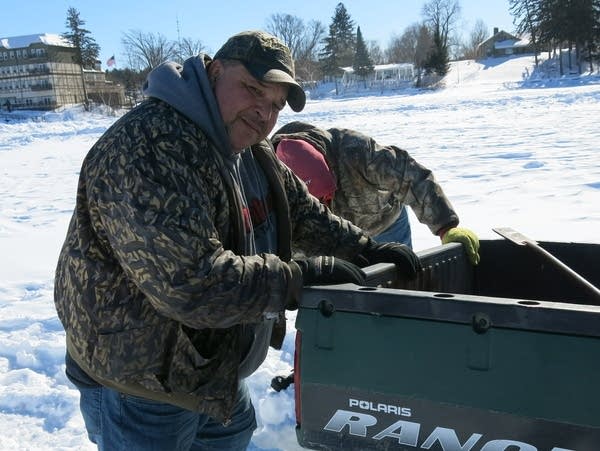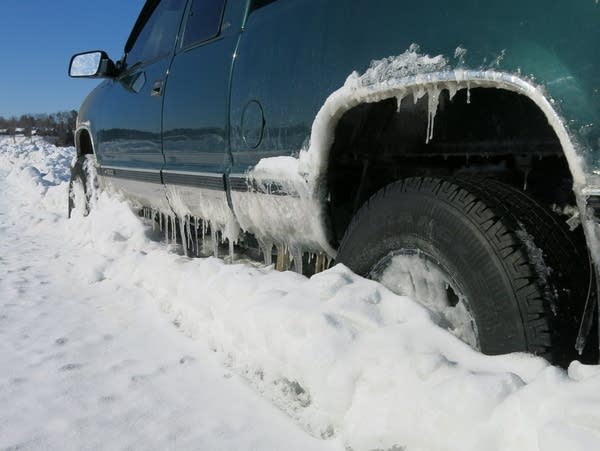Anglers struggle to retrieve frozen ice houses after festival

Go Deeper.
Create an account or log in to save stories.
Like this?
Thanks for liking this story! We have added it to a list of your favorite stories.
The surface of Leech Lake looks like a ghost town more than a week after it was buzzing with anglers during the annual Eelpout Festival. Clusters of ice houses sit abandoned in feet of crusty slush and drifting snow. Trucks are buried to their axles and frozen solid.
Monday is the deadline to remove fish houses across the southern two-thirds of Minnesota. Northern Minnesota anglers, including those on Leech Lake, have until March 18 to clear the lakes. But record-deep snow is making the job almost impossible for some.
"Mother Nature, she's mean," said Mark Kimmerle, who works for Shriver's Bait Co. in Walker, Minn.
The business rented out five ice houses to anglers during the festival. But by the third day, ice roads across the lake were covered in 2 feet of slush. The combination of heavy snow and heavy vehicle traffic cracked the ice sheet. Water oozed out and partially refroze. Everyone should have left right then, said Kimmerle, but it was a party and people were drinking.
Turn Up Your Support
MPR News helps you turn down the noise and build shared understanding. Turn up your support for this public resource and keep trusted journalism accessible to all.
"That's what Eelpout Festival is. Just let some steam off in the middle of winter," he said.
Now, roughly 50 ice houses are stranded on the lake. Five belong to Kimmerle's boss, Jack Shriver, who regrets not pulling his houses earlier.
"You don't sleep too good at night, let's put it that way," he said. "We just hope things work out, and we catch a break, and we can get them off without breaking all our equipment."

In the days since the Eelpout Festival, the slush developed a crust that feels solid. But it's only a few inches thick.
Sustained cold weather would help freeze all of the water underneath the crust and allow vehicle traffic to resume on the ice sheet. But with spring fast approaching, Craig Nelson, who owns 13 stranded ice houses on the lake, wonders if that will happen.
"It takes a long time for that water to freeze," he said.
Nelson has a lot to lose if his ice houses can't be recovered, but he knows others who have it worse. Some out-of-town anglers had to rent cars to get home, he said, after their ice houses and trucks were stranded.

Leech Lake isn't the only problem spot. Deep snow statewide means anglers in many places are fighting to retrieve their ice houses. People who miss the deadlines face a fine. But it's the prospect of a more expensive recovery effort that worries Shriver.
Pulling an ice house off the bottom of a lake isn't cheap. On a recent morning, he took out his ATV to check on his houses.
He made it about a quarter mile onto the lake before the wheels sank through the crusty top layer of ice and spun up streams of slush.
"I need a shovel," he said, "and a tow rope."
Eventually, he recruited a daring Bobcat driver to pull the ATV to safety.
"I gave him 20 bucks," Shriver said. "It's the only thing I had in my pocket."

Shriver's ATV was the only thing coming off the ice that day, and maybe for a while.
The bait shop might have to pay a fine if it misses the state department's removal deadline. Kimmerle says that's fine. He just hopes the ice is still strong enough to support vehicles once the snow melts away.
"If it melts way too fast," he said, "then we're in trouble."


